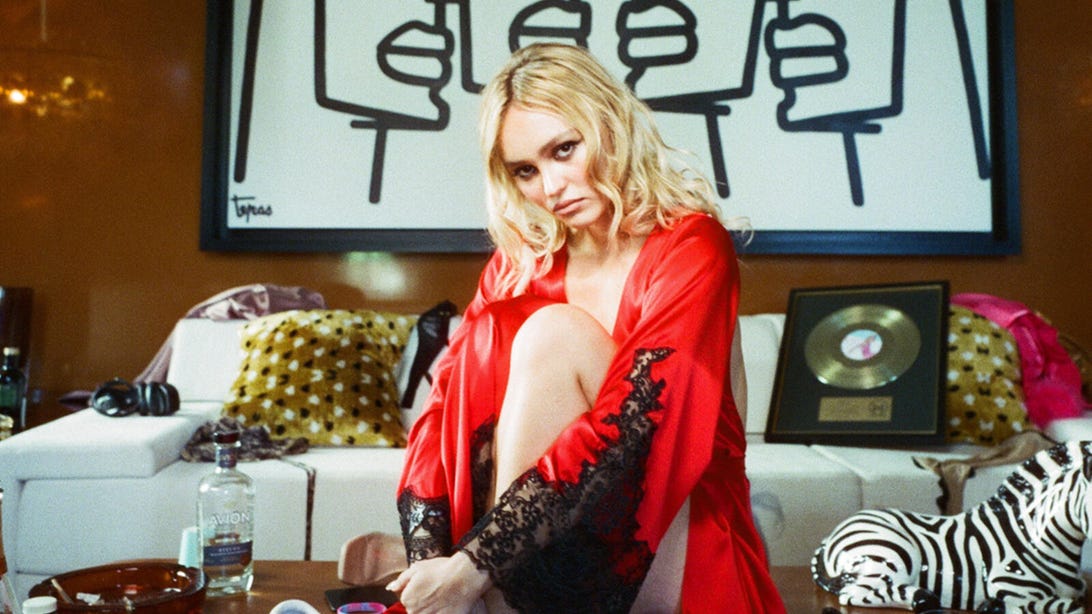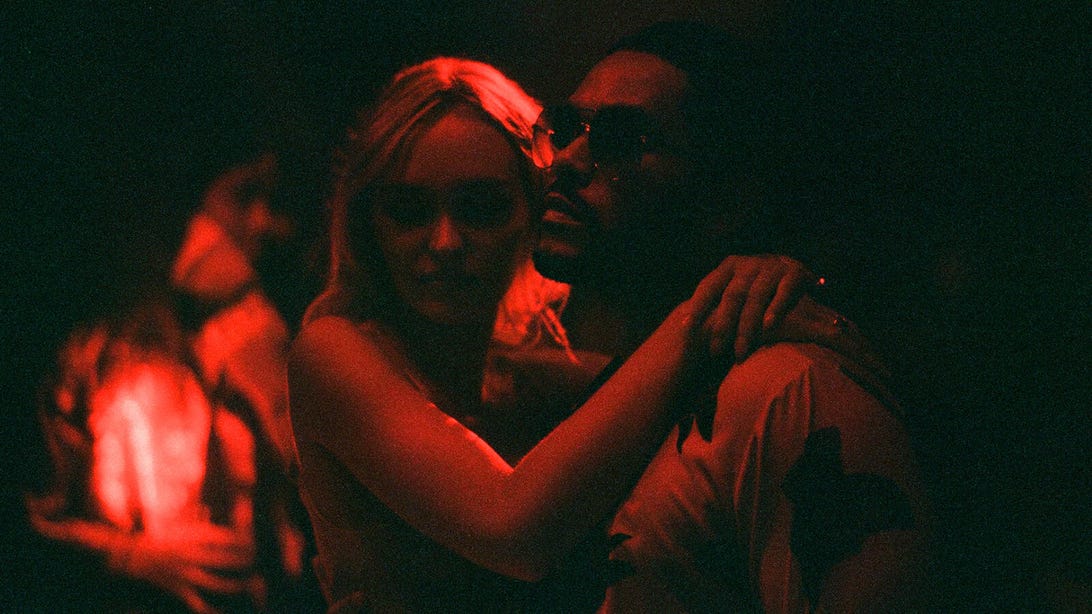Join or Sign In
Sign in to customize your TV listings
By joining TV Guide, you agree to our Terms of Use and acknowledge the data practices in our Privacy Policy.
HBO's The Idol Is All Shock and No Value
Lily Rose Depp and The Weeknd provides fifty shades of bleh

Lily-Rose Depp, The Idol
Eddy Chen/HBOThere were no illusions The Idol was going to be a family-friendly affair. From the moment the now-famous Rolling Stone article hit the internet, citing sources who claimed HBO's limited series was "torture porn" and plagued with production problems, viewers and critics alike have been wondering just how brutal and graphic the limited series would be.
Add in a debut shrouded in secrecy (HBO refused to release advance screeners to critics) and a two-episode premiere at Cannes that resulted in an abysmal Metacritic score in the 20s, and it was only natural to prepare for the worst.
According to HBO, The Idol is a series about a pop star named Jocelyn (Lily-Rose Depp) who is claiming "her rightful status as the greatest and sexiest pop star in America" following a nervous breakdown. When she encounters Tedros (Abel "The Weeknd" Tesfaye), "a nightclub impresario with a sordid past," Jocelyn experiences a romantic awakening that will either "take her to glorious new heights or the deepest and darkest depths of her soul."
According to various interviews with co-creators Tesfaye and Sam Levinson (Euphoria), The Idol is an examination of celebrity culture and the price of fame, told through the lens of a stuck artist who is searching for her voice.
There are hints of that show in the premiere. The series opens with Jocelyn posing for her new album cover, while her team commodifies her. There is the immediate sense that this is a high-stakes comeback and that Jocelyn is dealing with the trauma of losing her mother. Yet no one consults Jocelyn, solicits her opinion, or dares discuss anything of substance around her. Is it because she's too fragile? Was her mother the gatekeeper of such things before her departure? Or is this a commentary on the treatment of real-life pop stars like Britney Spears?
More on HBO:
Unfortunately, that's about as deep as the show gets in its first hour. Rather than leaning into those themes, the show veers hard into the sex of it all and creates problematic storylines that sexualize violence, mental health problems, and power dynamics. The most problematic thing about The Idol, however, isn't even the subject material or the overt sexualization of dangerous issues. Nope, the most glaring problem is that it's just plain boring.
That's not to say there's no potential. Some of it is interesting, at first. There's the double-standard juxtaposition of Jocelyn as a sex symbol with her actual sex life, in which someone has leaked a photo of her with bodily fluids on her face. As Jocelyn practices a very Britney-esque music video with grinding backup dancers (including steamy shots with Blackpink's Jennie Kim in her acting debut), her team argues over how to shape the narrative surrounding the photo while keeping its existence from Jocelyn.
That's about where the intrigue ends. When Jocelyn and viewers finally do see the photo in question, her reaction is so lacking you wonder why it needed to be kept from her in the first place. More importantly, what was the point of its existence? If it was to discuss the victimization or commodification of female celebrities, surely there are more interesting ways to do so or a bigger reaction to be had.
Instead, the show is a series of similarly slow-paced scenes that would have Introduction to Writing profs, with their "show don't tell" mantras, cringing. If that first photoshoot scene was to establish what a great actor Jocelyn is, she internalizes everything to a disappointing degree with each subsequent scene.
With that lack of intent, context, or purpose, these sexually charged interactions are careless and even dangerous. As Jocelyn poses for the photos, for example, she exposes her breasts and breaks her own contract rider. When the intimacy coordinator steps in, Jocelyn's manager (played by an inexplicably accented Hank Azaria) locks him in the closet so he can no longer "cockblock" America.
With that one scene, the show mocks and even sets back all of the hard work and progress actual victims and survivors in the industry have fought for since #MeToo became a hashtag. It also flips the finger at any critics who dare question the show's subsequent use of sexuality, slyly painting naysayers as prudes and potentially even encouraging physical violence.
Then there's the sexualization of mental health, which Jane Adams' Nikki character advocates for when Jocelyn sports a hospital bracelet during the aforementioned photoshoot. One team member questions it, but Nikki explains it is the one thing that allows average Joes to believe they've got a shot with the pop princess: She may just be crazy enough to let them f--- her.
We're told about these mental health struggles, by the way, but we never see them. Instead we see a young woman who realizes her team is keeping things from her and bucks up to get the job done and satiate them. And all in an outfit that threatens to expose her nipples any second.
Instead of building character layers, the singer sucks back more cigarettes, tells a Vanity Fair reporter she answers to "God," and plots a night out at the club. It's a hollow take at best that fails to deliver anything interesting or of substance. Unless of course you're there for lingering shots of young girls dancing, swaying their hips, and closing their eyes in a euphoric state of not giving a damn.
And then The Weeknd steps in, and any pretense at a point — at least in Episode 1 — crumbles.

Lily-Rose Depp and Abel "The Weeknd" Tesfaye, The Idol
Eddy Chen/HBOAt the club, Tedros immediately woos Jocelyn and takes her to the stairwell for a quick hookup. The pair evade the singer's best friend and assistant Leia (Rachel Sennott), who has Jocelyn's best interests at heart but is instead set up as the nagging friend who doesn't want Joce to have any fun. Immediately, Tedros sends his buddy to distract Leia, and you spend the next few scenes worrying about whose drink is about to be roofied.
For his part, Tedros imparts cringey wisdom about how pop music is like a Trojan Horse: It lures people in but then imparts a larger message. Is he alluding to his motives in grooming Jocelyn away from her people and into his cult with lines better suited for a brooding high school boyfriend? Is this Levinson promising that after all of this sex, the series will have a point?
Later, turned on by the encounter, Jocelyn masturbates and chokes herself at home, playing into the very real and increasingly alarming trend of normalizing strangulation in intimacy. That's further solidified when Jocelyn tells Leia she wants to invite Tedros over. Leia straight up disagrees and says the guy gives off "rapey" vibes. "I kinda like that about him," Jocelyn shoots back.
The ultimate guide to what to watch on Netflix, Prime, Max, and more in June
In an episode told exclusively from the male gaze, it's the most cringeworthy of lines. No woman wants to be raped. Some women fantasize about bondage, male control, and yes, even strangulation. But in this context it's yet another dangerous normalization, one set against dark cinematography, eerie background music, and horror movie vibes that grow darker with each passing scene.
By the time Jocelyn has Tedros over for a thinly veiled booty call, it goes even further. She opens up about hating her new single, to which he replies the problem is her voice. She doesn't sing like she knows how to f---, he tells her as he runs an ice cube up her bare leg. "Do you trust me?" he continues. She does not, yet she still allows him to slip her robe over her head and slowly strangle her. Just when she is about to run out of air, he tells her to open her mouth and cuts a hole into the robe with a giant knife he's brought along.
"Now you can sing," he whispers as the episode cuts to the credits.
You're left wondering what just happened. At this point in the TV landscape, so many have extended the limits of storytelling, which means creating shock value is a lot harder than it used to be. Some of The Idol is shocking, sure. But is there really value? So far, not really.
Levinson and co. could very well be setting up some smart critique or commentary about our everyday idols and why we shouldn't elevate them or aspire to be them with our myriad social media accounts and daily overexposure. But are viewers really willing to slog out five more episodes to find out? That depends on just how much fans idolize The Weeknd after all.
The Idol airs Sunday nights at 9/8c on HBO.